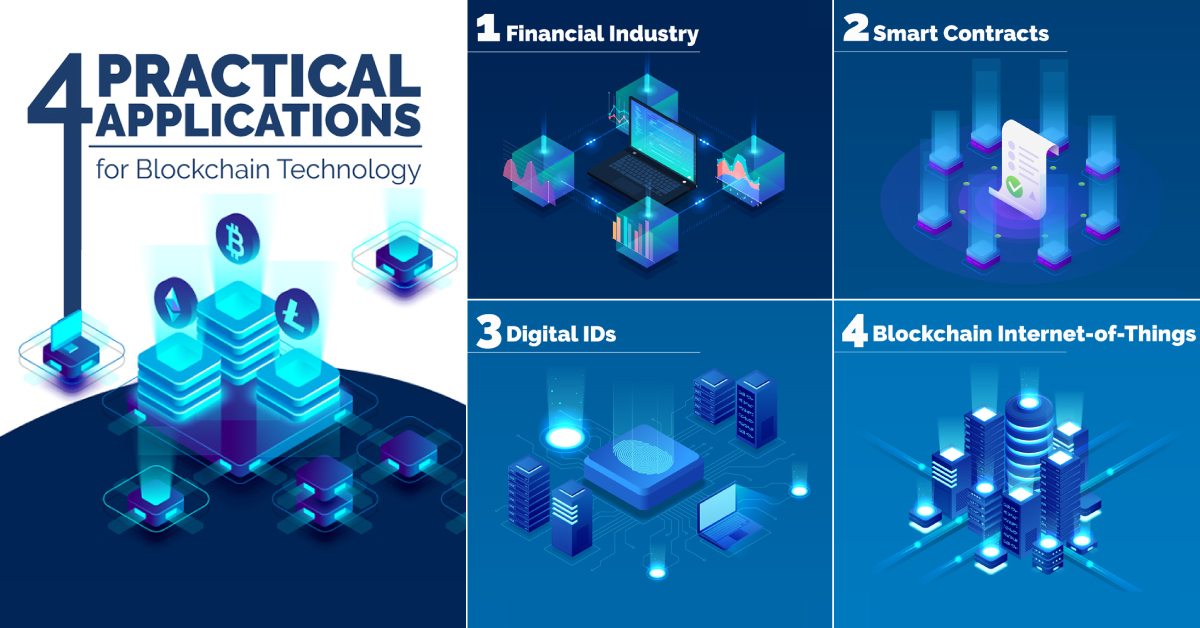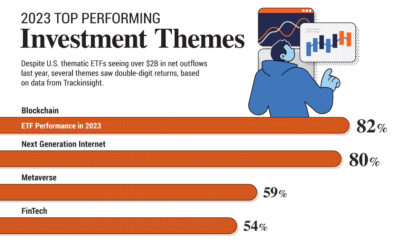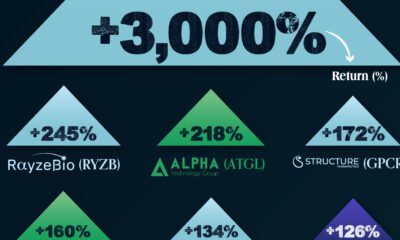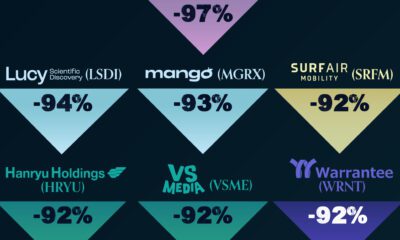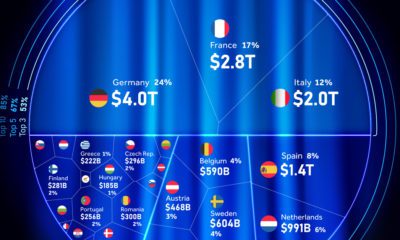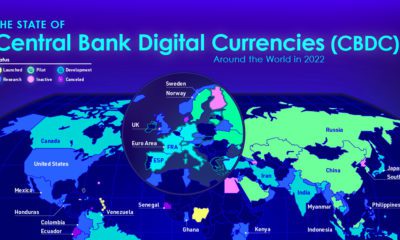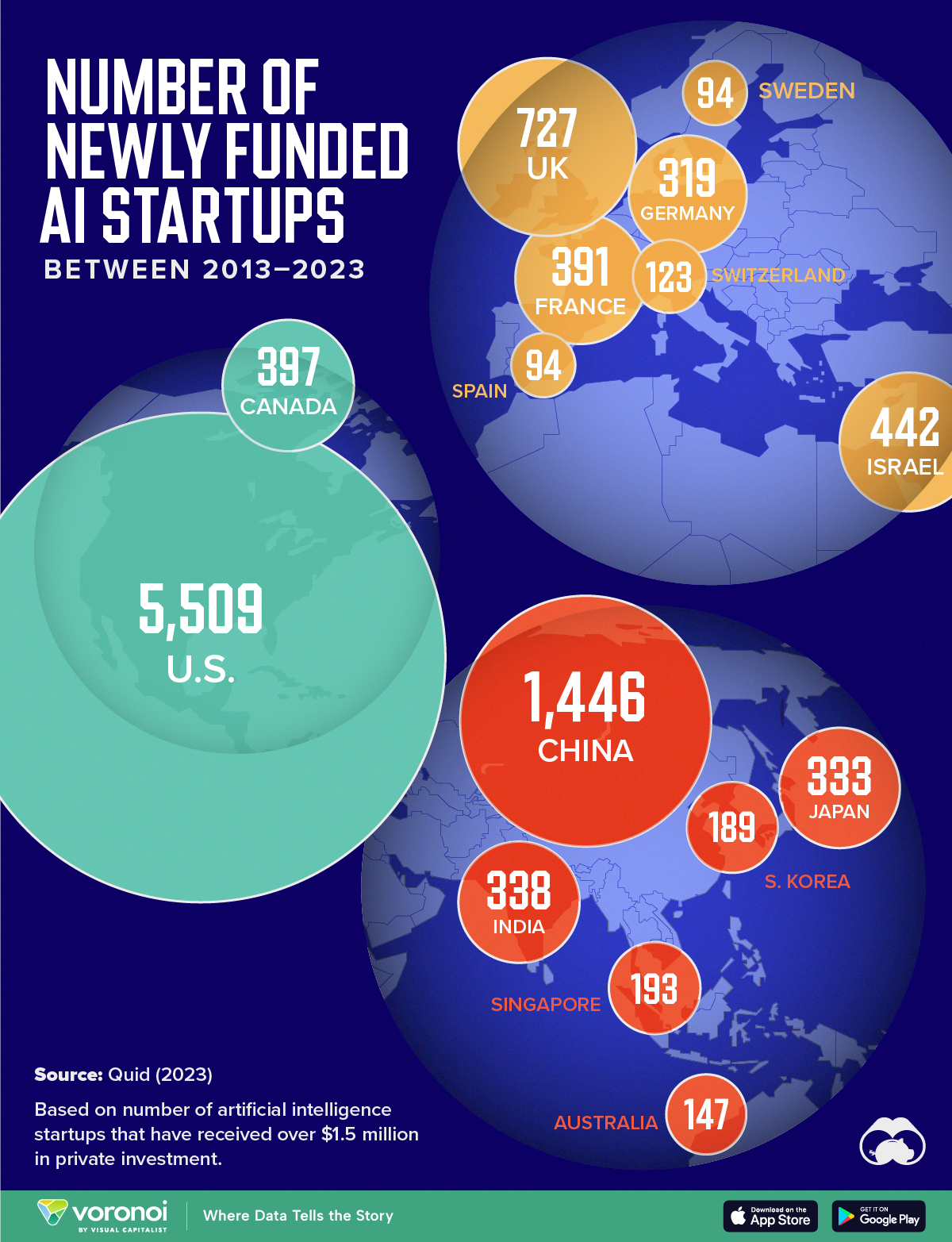Technology
Exploring the Practical Applications of Blockchain Technology
In a few short years, blockchain technology has been steadily gaining traction in traditional business applications around the world.
So much so, that blockchain-focused venture capital fundraising tripled to $3 billion between the years 2017 and 2018.
Four Practical Uses for Blockchain Tech
Today’s graphic from Noah Coin highlights four major sectors where blockchain technology is being used to innovate and enhance important business processes.
In an increasingly digital world, which industries are being transformed by blockchain?

One of the primary benefits of blockchain technology is its immutability─the unchangeable nature of the “ledger” of data posted to the network.
This critical feature can provide widespread benefits across a variety of industries around the world. Let’s dive into some key examples.
Major Practical Applications of Blockchain
1. Financial Services
Recent numbers show that the asset management industry could cut costs by $2.7 billion every year by moving to blockchain tech. Practical applications of blockchain in the financial services industry include client screening and onboarding, recordkeeping, data privacy and security, and trade processing.
Similarly, the insurance industry is fraught with errors and costly mistakes. The FBI estimates that over $40 billion a year is lost through fraud across all non-health insurance industries.
Example solution:
- RiskBlock, a proof-of-insurance product, helps insurers save time and money through automated processes, and it helps insured individuals validate their insurance claims securely and quickly.
2. Smart Contracts
Blockchain and smart contract technologies function well in instances where legal contracts are required to maintain ownership rights and data privacy laws. These customizable, self-executing smart contracts on the blockchain can be easily managed by all parties.
Issues with ownership rights and royalties are commonplace within the entertainment industry. To navigate these issues, blockchain technology offers an unchangeable, traceable, real-time distribution and reporting network for all involved.
Example solution:
- Ujomusic is one such application that is helping artists track their royalties worldwide.
3. Digital IDs
According to the World Bank, over 1.1 billion people worldwide still have no way to prove their identity. At the same time, companies and financial institutions in both traditional and digital markets are being required to follow more stringent know-your-customer (KYC) initiatives.
Despite this, many providers are still not sufficiently meeting these standards; to further complicate things, regulations vary widely from jurisdiction to jurisdiction.
Example solution:
- Companies like IBM, Microsoft, and Cisco are migrating to the blockchain to securely and privately verify users.
4. Blockchain Internet of Things (IoT)
Gartner predicts that 20.4 billion IoT-connected devices will be active by the end of 2020, with some estimates showing the IoT market will reach $3 trillion annually by 2026.
Blockchain-enabled IoT devices would operate faster and more securely for both users and businesses─enabling less centralized control over the financial industry, internet usage, and ownership rights.
Example solution:
- Helium uses a decentralized machine network to simplify connecting anything to the internet through a blockchain, wireless network, and open-source software.
A Blockchain-enabled Future
Blockchain technology promises to be the next major tidal wave of innovation. While still in its infancy, practical blockchain applications are becoming more mainstream.
As blockchain adoption spreads, it can become a driving force for promoting equitable societies, solving complex economic issues, and transforming how we live and work every day.
Digital Transformation
Mapped: The Number of AI Startups By Country
Over the past decade, thousands of AI startups have been funded worldwide. See which countries are leading the charge in this map graphic.
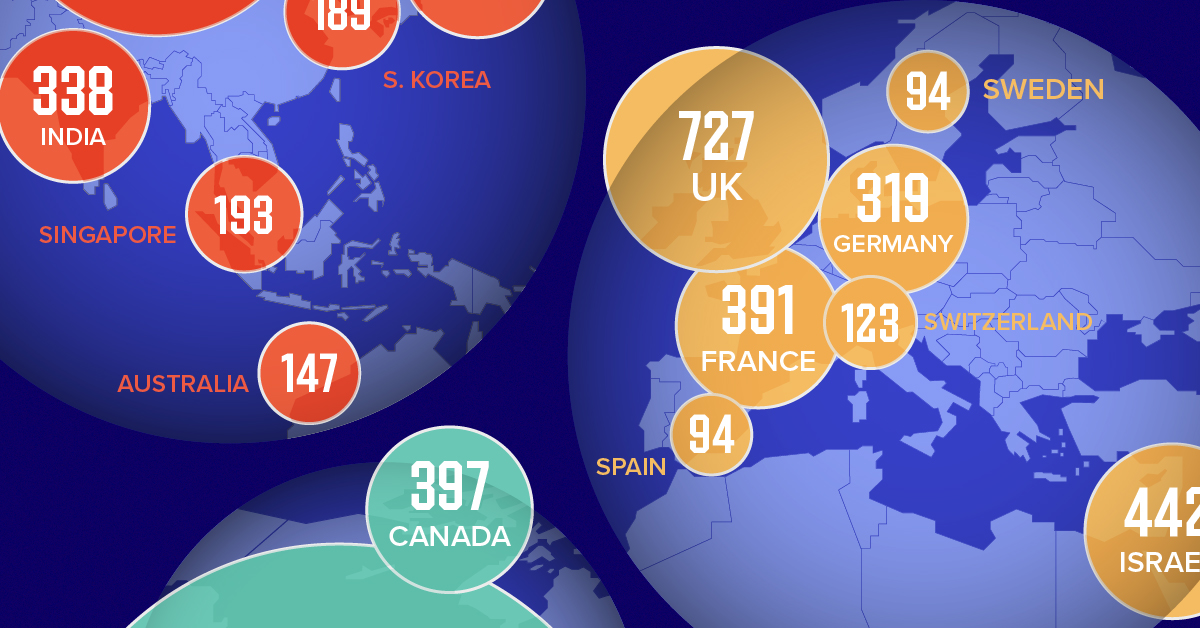
Mapped: The Number of AI Startups By Country
This was originally posted on our Voronoi app. Download the app for free on iOS or Android and discover incredible data-driven charts from a variety of trusted sources.
Amidst the recent expansion of artificial intelligence (AI), we’ve visualized data from Quid (accessed via Stanford’s 2024 AI Index Report) to highlight the top 15 countries which have seen the most AI startup activity over the past decade.
The figures in this graphic represent the number of newly funded AI startups within that country, in the time period of 2013 to 2023. Only companies that received over $1.5 million in private investment were considered.
Data and Highlights
The following table lists all of the numbers featured in the above graphic.
| Rank | Geographic area | Number of newly funded AI startups (2013-2023) |
|---|---|---|
| 1 | 🇺🇸 United States | 5,509 |
| 2 | 🇨🇳 China | 1,446 |
| 3 | 🇬🇧 United Kingdom | 727 |
| 4 | 🇮🇱 Israel | 442 |
| 5 | 🇨🇦 Canada | 397 |
| 6 | 🇫🇷 France | 391 |
| 7 | 🇮🇳 India | 338 |
| 8 | 🇯🇵 Japan | 333 |
| 9 | 🇩🇪 Germany | 319 |
| 10 | 🇸🇬 Singapore | 193 |
| 11 | 🇰🇷 South Korea | 189 |
| 12 | 🇦🇺 Australia | 147 |
| 13 | 🇨🇭 Switzerland | 123 |
| 14 | 🇸🇪 Sweden | 94 |
| 15 | 🇪🇸 Spain | 94 |
From this data, we can see that the U.S., China, and UK have established themselves as major hotbeds for AI innovation.
In terms of funding, the U.S. is massively ahead, with private AI investment totaling $335 billion between 2013 to 2023. AI startups in China raised $104 billion over the same timeframe, while those in the UK raised $22 billion.
Further analysis reveals that the U.S. is widening this gap even more. In 2023, for example, private investment in the U.S. grew by 22% from 2022 levels. Meanwhile, investment fell in China (-44%) and the UK (-14.1%) over the same time span.
Where is All This Money Flowing To?
Quid also breaks down total private AI investment by focus area, providing insight into which sectors are receiving the most funding.
| Focus Area | Global Investment in 2023 (USD billions) |
|---|---|
| 🤖 AI infrastructure, research, and governance | $18.3 |
| 🗣️ Natural language processing | $8.1 |
| 📊 Data management | $5.5 |
| ⚕️ Healthcare | $4.2 |
| 🚗 Autonomous vehicles | $2.7 |
| 💰 Fintech | $2.1 |
| ⚛️ Quantum computing | $2.0 |
| 🔌 Semiconductor | $1.7 |
| ⚡ Energy, oil, and gas | $1.5 |
| 🎨 Creative content | $1.3 |
| 📚 Education | $1.2 |
| 📈 Marketing | $1.1 |
| 🛸 Drones | $1.0 |
| 🔒 Cybersecurity | $0.9 |
| 🏭 Manufacturing | $0.9 |
| 🛒 Retail | $0.7 |
| 🕶️ AR/VR | $0.7 |
| 🛡️ Insurtech | $0.6 |
| 🎬 Entertainment | $0.5 |
| 💼 VC | $0.5 |
| 🌾 Agritech | $0.5 |
| ⚖️ Legal tech | $0.4 |
| 👤 Facial recognition | $0.3 |
| 🌐 Geospatial | $0.2 |
| 💪 Fitness and wellness | $0.2 |
Attracting the most money is AI infrastructure, research, and governance, which refers to startups that are building AI applications (like OpenAI’s ChatGPT).
The second biggest focus area is natural language processing (NLP), which is a type of AI that enables computers to understand and interpret human language. This technology has numerous use cases for businesses, particularly in financial services, where NLP can power customer support chatbots and automated wealth advisors.
With $8 billion invested into NLP-focused startups during 2023, investors appear keenly aware of this technology’s transformative potential.
Learn More About AI From Visual Capitalist
If you enjoyed this graphic, be sure to check out Visualizing AI Patents by Country.
-

 Energy6 days ago
Energy6 days agoMapped: The Age of Energy Projects in Interconnection Queues, by State
-
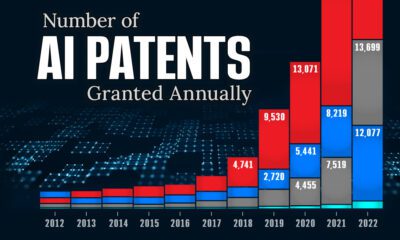
 AI2 weeks ago
AI2 weeks agoVisualizing AI Patents by Country
-
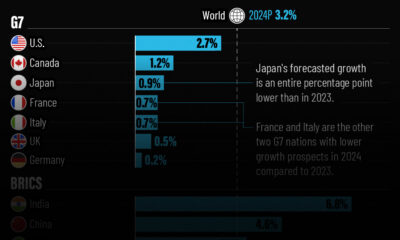
 Markets2 weeks ago
Markets2 weeks agoEconomic Growth Forecasts for G7 and BRICS Countries in 2024
-
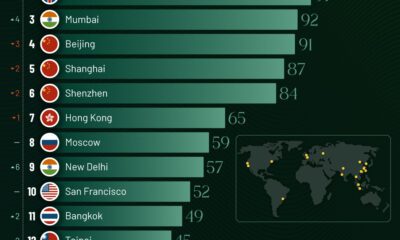
 Wealth2 weeks ago
Wealth2 weeks agoCharted: Which City Has the Most Billionaires in 2024?
-
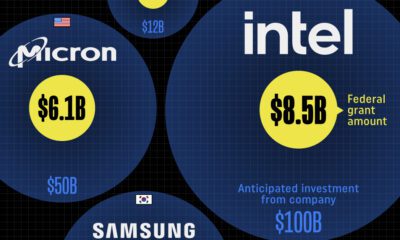
 Technology2 weeks ago
Technology2 weeks agoAll of the Grants Given by the U.S. CHIPS Act
-

 Green1 week ago
Green1 week agoThe Carbon Footprint of Major Travel Methods
-

 United States1 week ago
United States1 week agoVisualizing the Most Common Pets in the U.S.
-

 Culture1 week ago
Culture1 week agoThe World’s Top Media Franchises by All-Time Revenue

